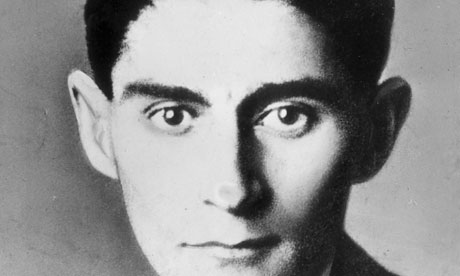
It’s easy to think of Franz Kafka as a celibate, even asexual, writer. There is the notable lack of eroticism of any recognizable sort in so much of his work. There is the prominent biographical detail—integral to so many interpretations—of his outsized fear of his father, which serves to infantilize him in a way. There is the image, writes Spiked, of “a lonely seer too saintly for this rank, sunken world.” All of this, James Hawes writes in his Excavating Kafka, “is pure spin.” Against such idolatry, both literary and quasi-religious, Hawes describes “the real Kafka,” including the fact that he was “far from an infrequent visitor to Prague’s brothels.” Though “tortured”—as his friend, biographer, and executor Max Brod put it—by guilt over his sexuality, Kafka nonetheless did not deny himself the frequent company of prostitutes and a collection of outré pornography.
But a part of the myth, Kafka’s extreme diffidence in romantic relationships with two women in his life—onetime fiancé Felice Bauer and Czech journalist Milena Jesenská—is not far off the mark. These relationships were indeed “tortured,” with Kafka “demanding commitment while doing his best to evade it.” His courtship with Felice was conducted almost entirely through letters, and his personal correspondence to both women, published in separate volumes by Schocken Books, “has all the earmarks of his fiction: the same nervous attention to minute particulars; the same paranoid awareness of shifting balances of power; the same atmosphere of emotional suffocation—combined, surprisingly enough, with moments of boyish ardor and delight.” So writes the New York Times’ Michiko Kakutani in her review of Letters to Felice in 1988.
A March 25, 1914 letter to Felice exemplifies these qualities, including Kafka’s tendency to “berate” his fiancé and to “backpedal” from the serious possibility of marriage. In answer to her seemingly unasked question of whether Bauer might find in him “the vital support you undoubtedly need,” Kafka writes,” there is nothing straightforward I can say to that”:
The exact information you want about me, dearest F., I cannot give you ; I can give it you, if at all, only when running along behind you in the Tiergarten, you always on the point of vanishing altogether, and I on the point of prostrating myself; only when thus humiliated, more deeply than any dog, am I able to do it. When you post that question now I can only say: I love you, F., to the limits of my strength, in this respect you can trust me entirely. But for the rest, F., I do not know myself completely. Surprises and disappointments about myself follow each other in endless succession.
The frustrated mystery, self-abasement, vague and fearful hints, and reference to dogs are all elements of the so oft-invoked Kafkaesque, though the frank proclamation of love is not. Not long after his 1917 diagnosis of tuberculosis, Kafka would break off the engagement. In 1920, he began his—also heavily scripted—affair with Jesenská, his side of which appears in the collected Letters to Milena. In these missives, the same set of personal and literary impulses alternate: tender expressions of devotion give way to dark and cryptic statements like “written kisses… are drunk on the way by the ghosts” and “I have spent all my life resisting the desire to end it.” One letter seems to have nothing at all to do with Milena and everything to do with Kafka’s project as a writer:
I am constantly trying to communicate something incommunicable, to explain something inexplicable, to tell about something I only feel in my bones and which can only be experienced in those bones. Basically it is nothing other than this fear we have so often talked about, but fear spread to everything, fear of the greatest as of the smallest, fear, paralyzing fear of pronouncing a word, although this fear may not only be fear but also a longing for something greater than all that is fearful.
Passages like these warrant the reduplication in Kakutani’s review title: “Kafka’s Kafkaesque Love Letters.” It is almost as if he used these letters as a testing ground for the tangled internal conflicts, doubts, and obsessions that would make their way into his fiction. Or that, in them, we see these Kafkaesque motifs distilled. It is during his engagement to Felice Bauer that Kafka produced “his most significant work, including The Metamorphoses,” and during his relationship with Milena Jesenská that my personal favorite, The Castle, took shape.
Although it has long been fashionable to resist the “biographical fallacy,” reading an author’s life into his or her work, the existence of hundreds of Kafka’s letters in publication makes this separation difficult. Elias Canetti described Kafka’s letters as a dialogue he was “conducting with himself,” one which “provide[s] an index of the emotional events that would inspire ‘The Trial’” and other works. Kafka’s unexpected bouts of romantic passion notwithstanding, these letters add a great deal of support to that critical assessment.
via Michiko Kakutani/New York Times
Related Content:
Vladimir Nabokov Makes Editorial Tweaks to Franz Kafka’s Novella The Metamorphosis
The Art of Franz Kafka: Drawings from 1907–1917
Josh Jones is a writer and musician based in Durham, NC. Follow him at @jdmagness


I am reading this discussion out loud and quickly to myself and I have to say, I am enjoying myself. This is my first visit to Open Culture and I like what I see here. This is just a quick note of thanks, the hour is getting late, and I want to return to reading quickly out loud so as to get the full flavor of your writing. Thank you and so long for now.